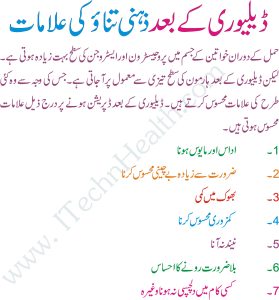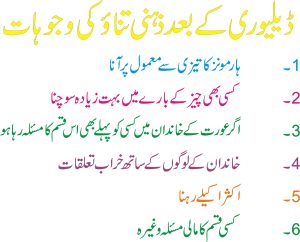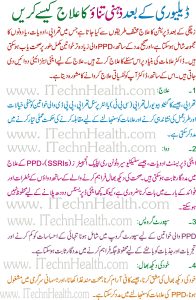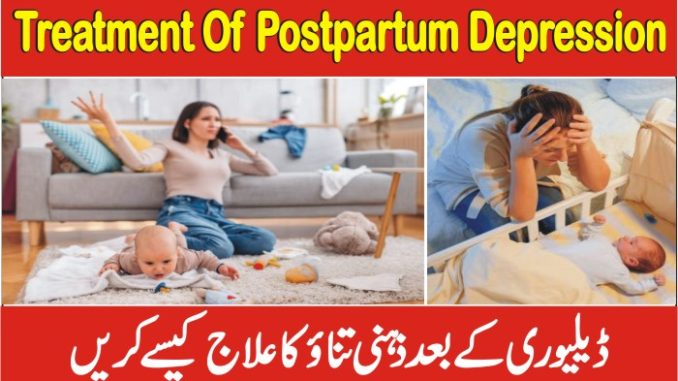
Postpartum depression (PPD) is a type of depression that can affect women after giving birth. It is a mood disorder that can cause feelings of sadness, anxiety, and exhaustion that can make it difficult for a new mother to care for herself or her baby. PPD can develop anytime within the first year after childbirth and is estimated to affect 10-20% of new mothers. Symptoms can range from mild to severe and may include feelings of hopelessness, irritability, loss of interest in activities, changes in appetite or sleep patterns, and thoughts of self-harm or harming the baby.
Motherhood is a joyous feeling for every woman. After nine months of pregnancy, when a woman gives birth, at that time women have to go through many changes. The time from pregnancy to delivery is very difficult. During pregnancy, women experience many physical and emotional changes. Undoubtedly, women’s bodies get some rest after delivery, but even then they do not get peace of mind. Women have to bear the full responsibility of the child after delivery. Also, full attention should be paid to their recovery. Due to this, women start suffering from anxiety and depression. Most women have stress problems after delivery.
During pregnancy, the levels of progesterone and estrogen in a woman’s body are very high. But hormone levels return to normal quickly after delivery. Due to which they experience various symptoms. The symptoms of postpartum depression (PPD) can vary from person to person, but may include:
1. Feelings of sadness, hopelessness, or emptiness
2. Loss of interest in activities that were once enjoyable
3. Difficulty bonding with the baby
4. Anxiety or panic attacks
5. Irritability or anger
6. Feelings of guilt or worthlessness
7. Changes in appetite or sleep patterns
8. Difficulty concentrating or making decisions
9. Thoughts of harming oneself or the baby
10. Physical symptoms such as headaches, stomach problems, or fatigue.
11. Feeling Weak
12. Insomnia
13. A Feeling Of Needlessly Crying
14. Lack Of Interest In Any Work etc
The exact causes of postpartum depression (PPD) are not fully understood, but research suggests that it may be caused by a combination of physical, emotional, and social factors. Some possible causes of PPD include:
After giving birth, there is a sudden drop in hormones such as estrogen and progesterone, which can affect a new mother’s mood and emotions.
Women with a family history of depression or other mood disorders may be more likely to experience PPD.
The physical and emotional demands of caring for a newborn, as well as changes in a woman’s personal and professional life, can be stressful and may contribute to PPD.
Women who have a history of depression, anxiety, or other mental health problems may be at higher risk of developing PPD.
Women who lack social support from family, friends, or partners may be more vulnerable to PPD. Some other symptoms include being alone most of time, poor relationships with family members and financial problem.
Postpartum depression is treated in a variety of ways may include therapy, medication, or a combination of both, and with the right support, most women with PPD can fully recover. Doctors treat this problem based on the symptoms. Anti-anxiety drugs are given for treatment. Along with this, the doctor advises you to undergo psychological therapy. Postpartum depression (PPD) is a treatable condition, and there are several effective treatment options available. The most common treatments for PPD include:
Talk therapy, such as cognitive-behavioral therapy (CBT) or interpersonal therapy, can help women with PPD identify negative thoughts and behaviors and develop coping strategies to manage symptoms.
Antidepressant medications, such as selective serotonin reuptake inhibitors (SSRIs), can be helpful in treating PPD. It’s important to discuss the risks and benefits of medication with a healthcare provider, as some antidepressants may not be safe for breastfeeding.
Joining a support group for women with PPD can be helpful in reducing feelings of isolation and providing a safe space to share experiences and emotions.
Practicing self-care, such as getting enough rest, eating a healthy diet, and engaging in physical activity, can help manage symptoms of PPD.
Combination therapy: Some women may benefit from a combination of therapy and medication.
It’s important to seek help if you are experiencing symptoms of PPD. With proper treatment and support, most women with PPD can fully recover and enjoy motherhood.
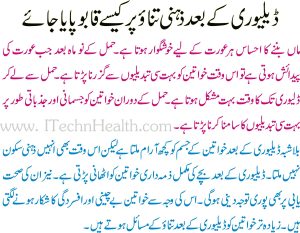
Treatment Of Postpartum Depression-What is the treatment of postpartum?-What medications are used to treat PPD?-What is the most effective treatment for post partum psychosis?-How do doctors treat postpartum anxiety?-Postpartum Depression: Causes, Symptoms & Treatment-How Doctors Diagnose and Treat Postpartum Depression
Treatment Of Depression And Psychiatric Disorders PDF Book Free Download
Depression Ka Nabvi Ilaj, Depression Se Bachne Ka Rohani Ilaj
Depression Ka Rohani Ilaj, Wazifa For Depression, Depression Ka ilaj Quran Se Wazifa
How Can I Protect My Baby In Winter, Tips To Keep Your Baby Safe In Winter Season
Which Oil Is Best For Baby Skin Whitening, Easy Tips for Baby’s Skin Healthy & Whitening
Khubsurat Beta Hone Ka Wazifa, Wazifa For Baby Boy During Pregnancy
How To Get Rid Of Heat Rash Quickly, Baby Rash, Diaper Rash On Baby
Home Remedy to Increase Baby Weight, Bachon Ko Mota Karne Ka Nuskha
How To Conceive A Baby Boy 100 Percent, Aulad e Narina Hone ka Wazifa Dua
How To Cured Occipital Neuralgia, Treatment of Nerve Pain in Head, Sir Ki Naso Me Dard Ka Ilaj
Seven Most Effective Natural Home Remedies To Get Rid Of Depression
